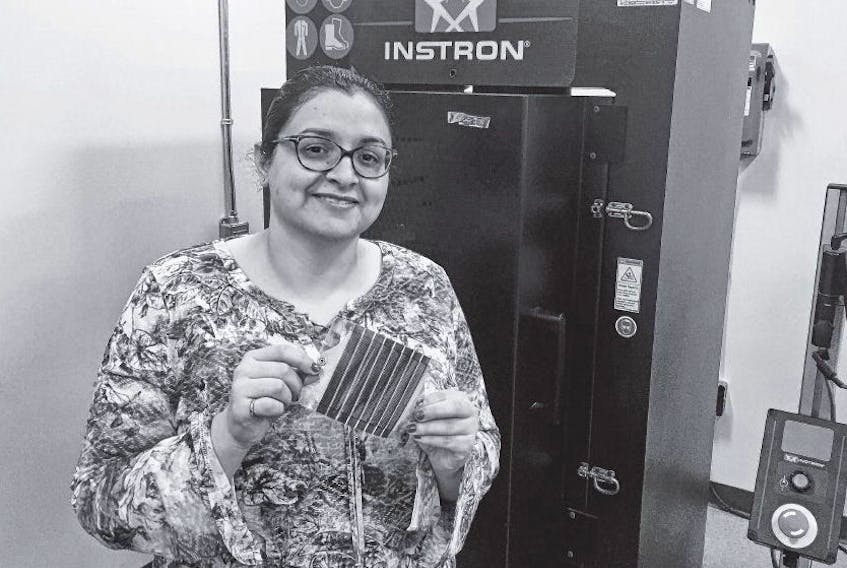Someday instead of asking Siri for the weather forecast, maybe you’ll ask your coat. And if it’s getting chilly, your outerwear will automatically warm up to compensate.
Or perhaps you’re sitting in your living room and the sun is getting in your eyes. No problem, just tell your curtains to close.
This kind of integrated electronic world is the vision of electrical engineer Ghada Koleilat, a pioneer in smart fabric technology.
“What we want to do is integrate them into the fabric itself so the user won’t even notice that the electronics are there,” said Koleilat, who joined Dalhousie University’s faculty of engineering in 2016 from Stanford University.
Her study of incorporating carbon nanotube technology into fabrics was one of three cleantech projects highlighted in a $5-million funding announcement Tuesday at the Dalhousie engineering school in Halifax.
“We can integrate them into fabric in your house, curtains, sofas, everything would be seamlessly integrated into whatever you want it to be,” Koleilat said after the announcement. “You can spray-coat them on any surface, you can print them, you can spincoat them, you can deposit them in a million different ways to conform to any shape that you want.”
Other funded projects included 3D-printing research at Dalhousie and a St. Francis Xavier University study into using environmentally friendly light-activated chemicals in manufacturing and medical processes.
The funding will come from the provincial government’s Research Nova Scotia Trust, the federal government and private donors.
“Research plays a vital, key role in helping our province progress and allows us to build the future of tomorrow’s companies,” said Advanced Learning and Labour Minister Labi Kousoulis at the announcement, which was hosted by Liberal MLA Hugh MacKay and also featured remarks from Colin Dodds of the Research Nova Scotia Trust and representatives from Dalhousie and St. F.X.
Kousoulis said the three projects are expected to create more than 69 jobs for research graduates, interns, lab technicians and project managers.
The leader of the St. F.X. study, Geniece Hallett-Tapley, said her research aims to curb reliance on fossil fuels in the production of drugs and plastics, as well as reducing toxic waste products such as chromium.
Instead, such manufacturing would run on a type of LED light that would replicate the safe spectrum of sunlight (as opposed to cancer-causing ultraviolet rays).
“(We’re) trying to find a way to make the nice part of sunlight do these reactions to minimize the energetic waste that would come from using high heat and high pressure reactions,” Hallett-Tapley said Tuesday after the funding announcement.
As a researcher at the early stage of her career — she joined the St. F.X. faculty only four years ago — Hallett-Tapley said this kind of support is crucial for expenses such as buying lab equipment and supporting student research roles.
She was joined at the announcement by her first master’s student, Bry Crabbe, who said he was drawn to this field of chemistry partly by its environmental aspects.
“It’s the modern age of chemistry, with everything switching from the way it used to be with harsh or carcinogenic processes moving towards the greener side of things,” said Crabbe, who joined Hallett-Tapley’s team as an undergraduate student three years ago and plans to begin his doctoral work at Dalhousie next year.
The 3D printing project, led by Paul Bishop of Dalhousie’s mechanical engineering department, will serve as a resource for Nova Scotia companies that want to develop this technology, which is also known as additive manufacturing. It transforms computer designs into physical products such as aerospace structures and custom biomedical implants.









